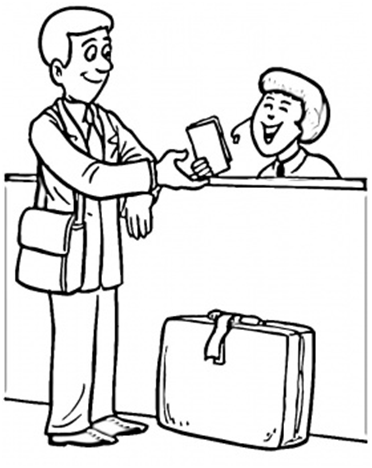Conversation at the Airport Check-in
Most people love travelling. The thrill of visiting new places, experiencing new cultures, meeting new people, probably learning a new language and viewing exciting and new vistas...everything makes travelling to a new places exciting and fun.
So, how do you travel to the wonderful places overseas? Of course, by the airplane, you would say! While airplanes have made traveling simpler and life easier, the whole process can be quite intimidating, or overwhelming, for a person who is not fluent in English. No matter what country you are travelling to, English is by far the most common language spoken all over the world. Even in countries where English is not the first language, airport authorities usually speak in English to get things moving. In such case, if you are not a confident English speaker, how will you talk your way into the check-in and other subsequent procedures? In this part of the series, 'situational conversations', we bring to you a gist of the standard conversation that can take place at the check-in counter of an airport. Thankfully, any conversation at the check-in (anywhere around the world) follows a standard pattern. Following is a rough idea of how the conversation progresses. While we are not saying that this is exactly what a conversation at the airport check-in will be like, however, you will get some idea that will help you in being prepared beforehand.
In such case, if you are not a confident English speaker, how will you talk your way into the check-in and other subsequent procedures? In this part of the series, 'situational conversations', we bring to you a gist of the standard conversation that can take place at the check-in counter of an airport. Thankfully, any conversation at the check-in (anywhere around the world) follows a standard pattern. Following is a rough idea of how the conversation progresses. While we are not saying that this is exactly what a conversation at the airport check-in will be like, however, you will get some idea that will help you in being prepared beforehand.
The conversation will be between the check-in clerk and the passenger. Just for the sake of brevity, we will call the check in clerk, just 'clerk' throughout the conversation.
Clerk: Good evening, sir.
Passenger: Good evening. Is this where I can check in for the flight to Phuket?
Clerk: Yes, absolutely. I am afraid that your flight has been delayed by one hour and ten minutes. It will leave at quarter past twelve.
Passenger: What! That is terrible.
Clerk: I am sorry, sir. The delay is due to bad weather. We can hardly do anything about it.
Passenger: Right.
Clerk: Can I please have your ticket and passport?
Passenger: Yes, sure. Here it is.
Clerk: Thank you.
Passenger: Can I take this handbag with me as hand luggage?
Clerk: Yes, sure. Provided it is small enough to fit under the seat or the Hand luggage compartment. Do you have any other luggage?
Passenger: Yes, I have two more bags, which I think will have to go in cargo.
Clerk: Did you get your luggage weighed? If it exceeds 30 kilograms, you will have to pay surcharges.
Passenger: No. Rather my luggage is within the 30 kilogram limit.
Clerk: That is good. Do you have a visa to enter Phuket?
Passenger: Yes, here it is.
Clerk: That is good to go. Please board from gate three. The boarding will start at 11:30. Have a nice flight, sir.
Passenger: Thank you.
That wasn't too difficult, was it? The first and foremost rung in the ladder of learning English is to be confident and open to learning. The English language is fun to learn and engaging, given that you approach it with the right attitude! If learning English is on your agenda, you should visit eAgeTutor and learn about the ways in which you can learn the wonderful English language.
How to Structure English Sentences?
What is your motive behind learning English? If you ask this to a bunch of English students, at least 60% of them will give the same answer – in order to speak fluent English. And that is exactly what we aim to do – to help you learn and improve your spoken English.
We have been publishing blogs after blogs, filled with important and helpful tips for not just improving English, but to also help you understand the rules of grammar, syntax and how to form sentences. We hope that you have been benefitting ample from our efforts.
Today's blog is about common phrases used in English. As you must have learnt so far, there is a specific way in which sentences in English are formed, and certain phrases have a common start/ end. Once you understand the basic structure of forming sentences, it will be easier for you to build on it. Spoken English can be classified, roughly, into three categories – Formal, semi-formal, and informal. We will give you a rough idea of how sentences are formed under these three categories.
• Formal: These kinds of sentences are usually used in offices and other official setups. In such situations, you need to maintain certain decorum, not just in your conduct, but in your speech as well. Before we give you the basics of formal sentences, remember that words like 'please' and 'thank you' form an important part of the formal conversations. Formal phrases, usually, start with 'You ought to...', like 'You ought to complete this file by evening' or 'you ought to attend this meeting.' This will get the work done, without you sounding too imposing! For a negative sense, you should use 'You ought not to...'.
• Semi-formal: This is when you are speaking to your colleagues or with a client over lunch. You can relax a bit during semi-final conversations, but that does not mean that you should speak nonchalantly. A good way to start a sentence is, 'I think you should + infinitive'. For example, "I think you should increase the quotation' or 'I think you should start using the other software'. The negation of the same would be, 'I don't think you should + infinitive'.
• Informal: This is when you are at home, or speaking to your friends. In such situations, all you need to pay attention is to be grammatically sound, and you are sorted. You can form your sentences as you like; just make sure that you keep in mind the basic rules of syntax and grammar.
"How to improve English speaking?" if this question has been giving you sleepless nights, then you have come to the right place. eAgeTutor is the place for all of your English speaking and English fluency needs.
Conversations while Ordering Food
There are techniques that can help you learn, practice, and polish your English. These techniques usually are carried out in a classroom, among friends or individually. These techniques, more often than not, include exercises like reading a newspaper or a book loud, speaking in front of a mirror, practicing pronunciation and fluency, etc.
However, have you ever wondered how much these exercises really help? We are not saying that these exercises are of no use, they definitely are. If not for these exercises, how else would you even learn new words, phrases, and idioms? How else would you learn the principles of grammar and other rules of the English language? These exercises are definitely a stepping-stone for a person who wishes to learn and speak English. However, practicing English in a classroom, and speaking English in a real-life situation are two very different things.
As important as it is to practice English speaking, it is even more important to implement the same in real-life situations. This will help you in gauging how much you have learned and how much you need to improve, the areas you need to work on, and what are your problem areas.
This is why we bring to you a series on 'situational conversations'. This is where we give you a real-life situation and the type of conversation you can encounter. While no one can predict how a conversation shapes, there are a few standard sentences exchanged in certain standard situations.
The first part in our series is:
Conversation in a restaurant while ordering food.
Waiter: Welcome to FoodRUs, what kind of table would you like, ma'am.
Customer: A table for two, please.
Waiter: This way, ma'am.
(After you are seated)
Waiter: Here are your menus. What kind of water would you prefer, bottled or mineral water?
Customer: Thank you. Mineral water should be fine. Make it chilled, please.
Waiter: Here is your water, ma'am.
Customer: Thank you.
Waiter: Are you ready to order, ma'am?
Customer: Yes, we would like to have pasta with sautéed vegetables and spicy chicken soup. We will order our main course later.
Waiter: Anything else ma'am, as a side dish?
Customer: This should be fine for now.
Waiter: Here is your pasta and here you go, your soup. Enjoy your meal. Bon Appetite.
So, as you can see, when ordering food in a restaurant, keep the conversation short, clear, and crisp. It is also important to be on your best manners when dealing with the waiter. And smile – do not forget to smile. Going to a restaurant means that you are about to have a good food experience, and a good, polite conversation will set the right mood!
For more such valuable and handy spoken English tips and tricks, it is vital that you sign up with our online English speaking classes. Fluent English speaking takes practice and patience, and with the right guidance, you can surely improve spoken English. Learning and speaking English is a requisite for excelling in today's world, and with the help of the right English classes, you can achieve the excellence in English speaking.
Memory Techniques for Learning English
When learning a new language, especially English, the most common problem people face is to memorize the never-ending words and phrases. After all, the English language has about 1,013,913 words, with new words being coined every now and then!
Now memorizing each and every word is a mean task, and not even the greatest scholars can know all about it. Adding to this mix is the fact that many individual word has multiple meanings. For example, the word 'set' has 424 meanings! That is a staggering number for a three-alphabet word.
Do not let these facts scare you. English is a helpful language, with so many people in so many countries speaking it. It is the language in which all official documentations are done, and it is the language of electronic communication as well.
In this day and age, you just cannot function without at least the basic knowledge of English. Learning spoken English is an active and gradual process, which one needs to keep practicing and improving.
There are many tips and tricks that one can employ to learn and improve English, however it is remembering that is the main issue. Many people struggle over using the right word at an appropriate time, which causes hindrance in their ability to speak fluent English. Following are a few simple memorizing techniques that are helpful for people new to English.
• Associate words with figures: There are many English words that people use in their day-to-day lives; however, apart from the 'common' ones, there is a horde of other words that one needs to know in order to communicate in the language. Remembering words after words can be a demanding task, and it is possible that you will not be able to remember every word that you learn. The trick here is to associate words with the objects that they represent. Like, when you are learning the word 'tiara', make a mental picture that it represents a crown worn by queens and princesses. This way, the next time you come across this word, you will know exactly what it means.
• Relate adjectives to activities: The next time you go to a park and get busy enjoying the beauty of the flora and fauna, make sure to use fitting adjectives. So, when you want to say, "What a colorful flower!" Instead, say, "What a brightly colored flower this is!" This is the best exercise for learning and getting into a habit of using adjectives. Associate adjectives with things and verbs, and try to think of a new one every day. If one day you use beautiful, then use pretty the other day. Adjectives lend emotions and vibrancy to any word or sentence, hence, learn as many as you can.
• Speak with emotions: Lending emotions to the words you are saying/ listening to helps in remembering them for a long time. For example, when you are asking a question, as it in an interrogative tone, or when you speak about something that surprises you, say it likewise. Using the words in the same tone that they imply helps in remembering the context in which they are used.
English learning, when done the right way, can be interesting and easy. The most sure-shot way of grasping the intricacies of this language is to enroll with an online English speaking course. With a professional and expert online English speaking course, English learning becomes engaging and simple!




